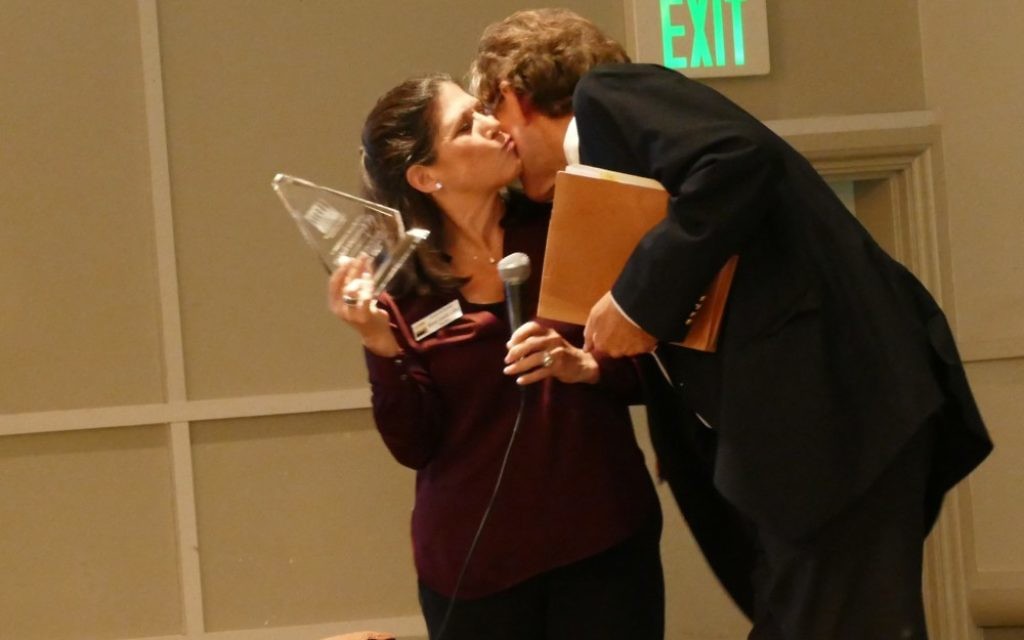Germany’s Nazi Trials Uphold Rule of Law
German lawyer Christoph Rueckel brought some good news to the nearly 300 people who turned out Sunday, Dec. 11, at Ahavath Achim Synagogue to hear him talk about ongoing German prosecutions of Nazis.
The German Supreme Court on Nov. 28 upheld the 2015 conviction of Oskar Groening and his four-year prison sentence for being an accessory to thousands of murders as the “bookkeeper of Auschwitz” with the Nazi SS during World War II.
“It is a clear statement: If you participate in Auschwitz, you are an accessory to murder, period,” Rueckel said. The crucial precedent now established in German law, he said, is that you can’t use a defense of “I was following orders” if you commit war crimes.
Get The AJT Newsletter by email and never miss our top stories Free Sign Up
Rueckel spoke at a gathering organized by Eternal-Life Hemshech, a group of Holocaust survivors, their descendants and their supporters. About 10 survivors were part of the crowd.

The four-year prison sentence against Groening is not important, Rueckel said. He suspects that Groening’s frail health will save him from ever serving a day in prison. But because his conviction makes him responsible for court costs, including the expense of Rueckel and other lawyers representing Holocaust survivors, Groening will lose his home and the wealth he has accumulated the past 70 years.
Reinhold Hanning, an SS noncommissioned officer who served as a guard at Auschwitz, also is awaiting word on a Supreme Court appeal of his July 17 conviction for accessory to murder. Because, unlike Groening, Hanning did not testify in court and contribute to getting the story of the Holocaust on the record, he was sentenced to five years in prison.
Rueckel said he expects the Supreme Court to uphold the conviction early in 2017, but he doesn’t think Hanning will serve prison time.
German prosecutors are investigating eight to 12 other former Nazis who served at concentration or death camps, and six are likely to be healthy enough to stand trial, Rueckel said. But the next round of cases will try to extend the legal precedent from cases of accessory to murder to the crime of attempted murder.
The argument is that holding people at Nazi concentration and work camps, even those whose main purpose wasn’t to slaughter people by the thousands, was tantamount to trying to kill them because the inevitable outcome of life in those camps was a slow, brutal death.
Rueckel, who is a partner in the German law firm Rueckel & Collegen and has an office in Midtown with BridgehouseLaw, said he and the several lawyers working with him to represent survivors in these German criminal trials are looking for survivors and relatives of survivors who were held at Stutthof, Bergen-Belsen or Neuengamme. Unlike the Groening and Hanning trials, prosecutors have agreed to come to the United States to take depositions.
Rueckel, who is Catholic, said that of the more than 15 private lawyers involved in the Nazi cases, perhaps one is Jewish, but the lawyers’ religions are irrelevant. Their involvement reflects their belief in the rule of law, not in any religion.
Any country devoted to the rule of law must pursue such justice, he said. “It is too late, but it’s never too late.”
One daughter of survivors said her father witnessed German guards who were shot for not obeying orders at a camp, and she noted that Groening drew prosecutors’ attention in part because he spoke out against Holocaust deniers and detailed what he saw at Auschwitz. She asked whether it was right to prosecute men for not risking their lives, then becoming witnesses for history.
Rueckel said he and the other lawyers wrestled with that question, but military historians assured them that if a soldier had moral problems with service at a camp, he could request a transfer to a front-line unit.
And soldiers such as Groening and Hanning weren’t common infantry troops. They were part of the brutal SS, and Rueckel said camp service was a reward for their time at the front.
“I had no other choice” was a defense higher-level officers tried to use in Germany’s 1965 Auschwitz trial, Rueckel said, but “it was wrong.”





comments